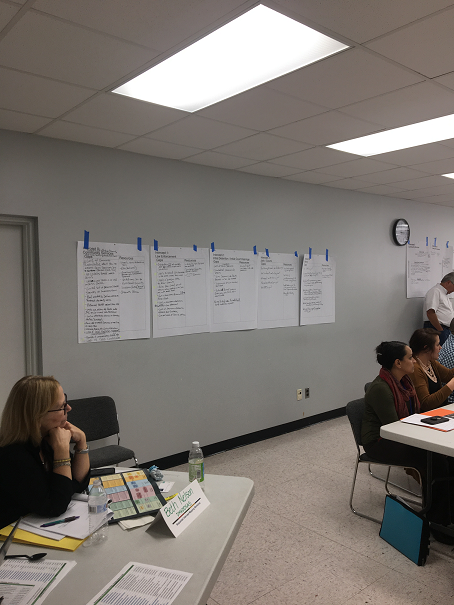Alamance County’s Stepping Up Initiative Is Reducing the Number of People with Mental Illnesses in Jail
With 555 participating counties across the U.S., the Stepping Up initiative is the nation’s most ambitious and far-reaching effort to reduce the prevalence of mental health conditions and substance use disorders in jails.
As Mental Health Awareness Month in May has concluded, Alamance County recognizes the seventh anniversary of Stepping Up, a national initiative reducing over-incarceration of people with mental illnesses. Stepping Up works with county and state leaders across the U.S. to collect and track baseline data on the number of people in jails with mental illnesses. Since launching in 2015, 555 counties across the U.S. have joined the Stepping Up movement. Today, more than half of the U.S. population lives in a county that has joined the Stepping Up initiative, including Alamance County.
As the Stepping Up initiative was launched nationally on May 15, 2015, by The Council of State Governments Justice Center, the National Association of Counties, and the American Psychiatric Association Foundation—it receives support from the U.S. Department of Justice’s Bureau of Justice Assistance. As a Stepping Up county, Alamance is part of a strong and expansive network of communities on the front lines of criminal justice reform across the U.S.
Alamance County Sheriff Terry Johnson has been at the forefront of these initiatives and remains a staunch supporter of Stepping Up, Crisis Intervention Team Training, and the much-needed Diversion Center.
Sheriff Johnson said, “I will not rest until we can provide those with mental illnesses the help and care they deserve such as a 24/7 Diversion Center instead of jail. We owe it to these folks and to the Citizens of Alamance County”.
As a member of the Stepping Up initiative since 2015, Alamance County has experienced a four percent reduction in jail bookings of people with mental health needs after implementing enhanced mental health screening, assessment, and treatment in the local jail—from 36% of the total jail population in 2019, to 32% in 2021.
In addition, Alamance County has made substantial progress over the past six years since joining the Stepping Up initiative, including but not limited to the following areas:
- Promoting CIT Training for law enforcement officers and others. Seeing that not only sworn officers receive 40 hours of Crisis Intervention Team (CIT) Training in mental health but also that there are detention officers, EMS staff and 911 operators who are CIT Trained—in addition to having Mental Health First Aid Training. The Sheriff and LE Chiefs in the county have made a commitment to having 100% of their sworn officers trained. Four to five local CIT Training classes are held annually towards this goal, with more than 200 completing the training in just over a two-year period.
- Through the addition of a licensed clinician, peer support specialist, and other behavioral health staff within the jail—there is earlier identification and treatment for those with mental illness and/or mental illness with co-occurring substance abuse. With a current rate of around 32% of detainees screening positive for mental illness, it is essential to have enhanced behavioral health services.
- The county’s ongoing and relentless commitment to seeing a 24/7 Diversion Center opened is actively being pursued and has been approved by the Board of County Commissioners with the hope of seeing such a center opened within the next twelve to eighteen months.
- All local Law Enforcement jurisdictions within the county now have access to Mental Health Co-Responders (licensed clinicians) through a partnership between the local Mental Health LME/MCO and the County Crisis Provider, RHA. In addition, our mobile crisis provider and other partners within the county are working to support the goal of diversion from jail and emergency room admission, whenever possible.
- A Quick Response Team is on the ground and actively working with law enforcement and EMS in the county to provide critical follow-up, treatment and resources to those who have experienced drug overdose—many of whom also have a mental health diagnosis.
In 2021, Alamance County Stepping Up Initiative further committed to the goals by participating in the SET, MEASURE, ACHIEVE program that was launched, establishing measurable goals to reduce the prevalence of behavioral health needs in jails. While data collection and evaluation is an ongoing and often difficult process, early data gathered in the third quarter of 2020—revealed that there was a 61% rate of those with mental illness returning to jail within one year of release, as opposed to only a 22% rate for the general jail population (those without identified mental illness). This data further validates why this work is so critical and reaffirms our county’s commitment to Stepping Up.
As data shows that individuals with a mental health diagnosis on average spend more days in jail than those without a mental health diagnosis; programs such as Alamance County Pretrial Release (a program initiated as part of the Stepping Up Initiative) are moving the needle. The number of days spent in jail for many with mental illness is decreasing, while at the same time, promoting earlier and more consistent intervention and treatment.
In 2021, the court appearance rate for Pretrial Release Program cases was over 89% and the safety rate (no additional crimes committed while in the program) was 95%. The addition in 2021 of a grant-funded Peer Support Specialist for detention, has also shown much success in connecting those in need of services post-release with treatment and services.
County leaders across the U.S. are encouraged to join the Stepping Up movement. Counties already participating in Stepping Up can sign on to the latest call to action, Set, Measure, Achieve, to receive tailored technical assistance with setting targets, collecting data, and analyzing results. Visit www.stepuptogether.org to learn more, subscribe to the Stepping Up mailing list, and follow #StepUp4MentalHealth on social media.
Counties can also leverage resources on the Stepping Up website such as the Stepping Up Self-Assessment Tool, Stepping Up Strategy Lab, briefs, case studies, and webinars to
learn more about how to form and engage a planning team, collect and analyze baseline data, and select programs, policies, and practices to implement in their counties.
Alamance County continues to support the work of the Stepping Up Initiative locally, statewide, and nationally, to promote awareness for those with mental illness and/or co-occurring disorders within our community.










